Living with Impermanence
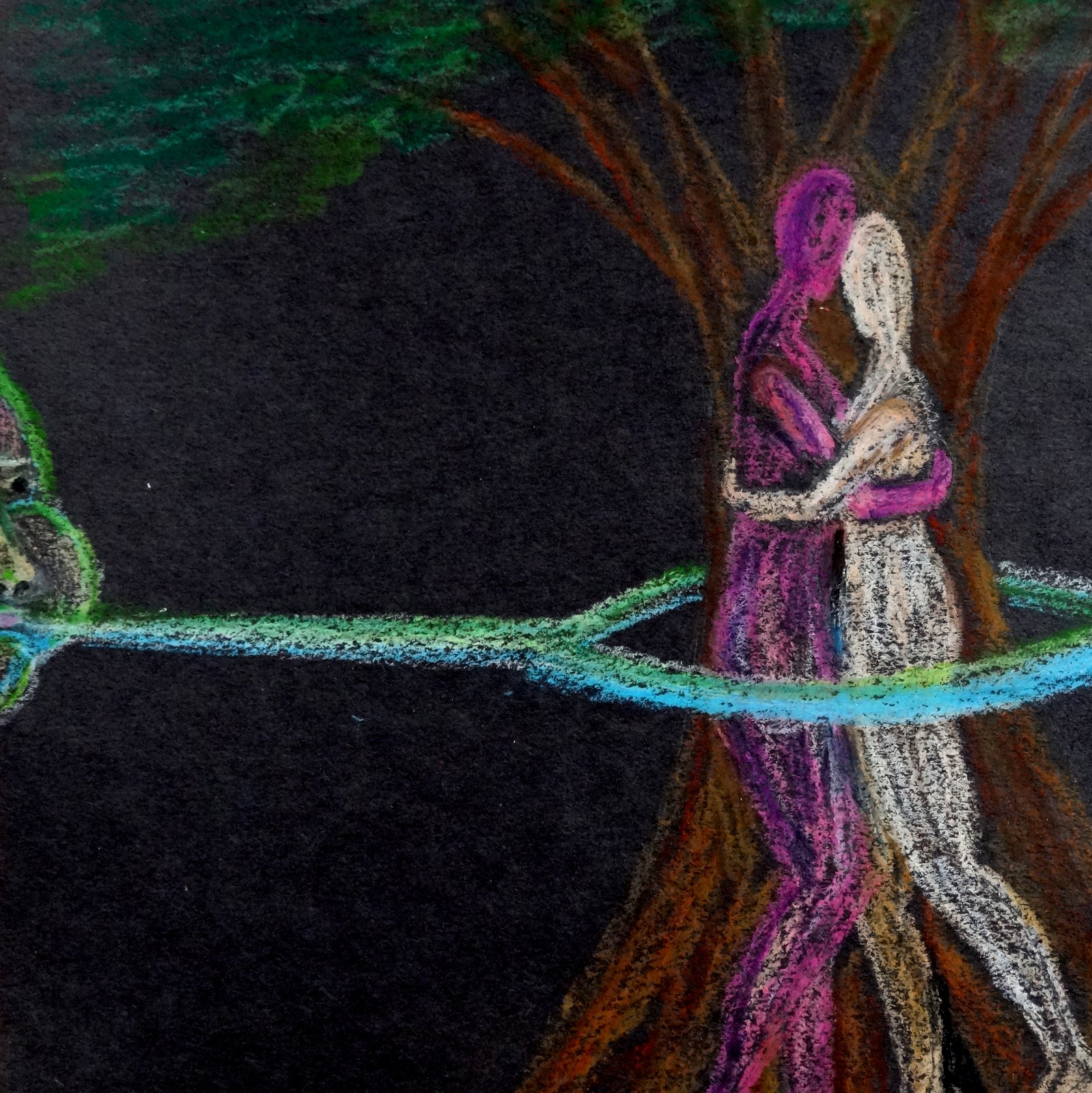
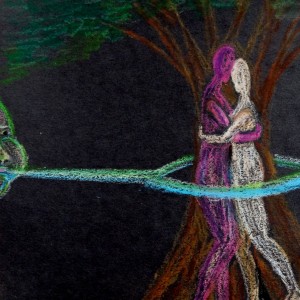 “You likely have cancer,” the oncologist said to Vic.
“You likely have cancer,” the oncologist said to Vic.
With those words, my husband and I landed in a world of crisis care and lost dreams.
I was (and still am) part of a women’s mythology class that had worked together since the late 1980s. A class member suggested we read the myth of Orpheus when she saw a copy of Rainer Maria Rilke’s Sonnets to Orpheus in a bookstore window.
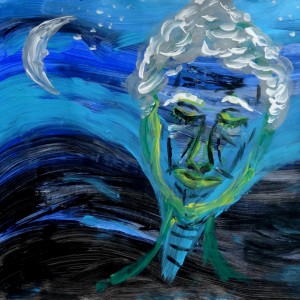
Orpheus was a demigod, musician, poet, and prophet in Greek mythology. After his beloved wife Eurydice died, he traveled to the Underworld to play his lyre, sing his grief lament, and gain his beloved’s release.
The beauty of his song convinced Hades and Persephone to grant Eurydice a return ticket to life, but Orpheus was told not to look back at Eurydice until they were in the Light. Being partly human, he glanced back and lost his Love forever to Death.
I understood the need to look back.
For over two years, while Vic was ill and after his death, we read various translations of the fifty-five sonnets, studied different versions of the myth, and painted Rilke’s poetic images—the gust of the god, a tree, a lyre. Rilke helped me practice the philosophical ideas I’d studied for years.
We are always surrounded by impermanence, but we look the other way. Everything we know shifts and changes, moves and transforms. The beauty of a sunset or a flower relies on constant transformation. So does mortality.
Ah, the knowledge of impermanence
That haunts our days
Is their very fragrance.[i]
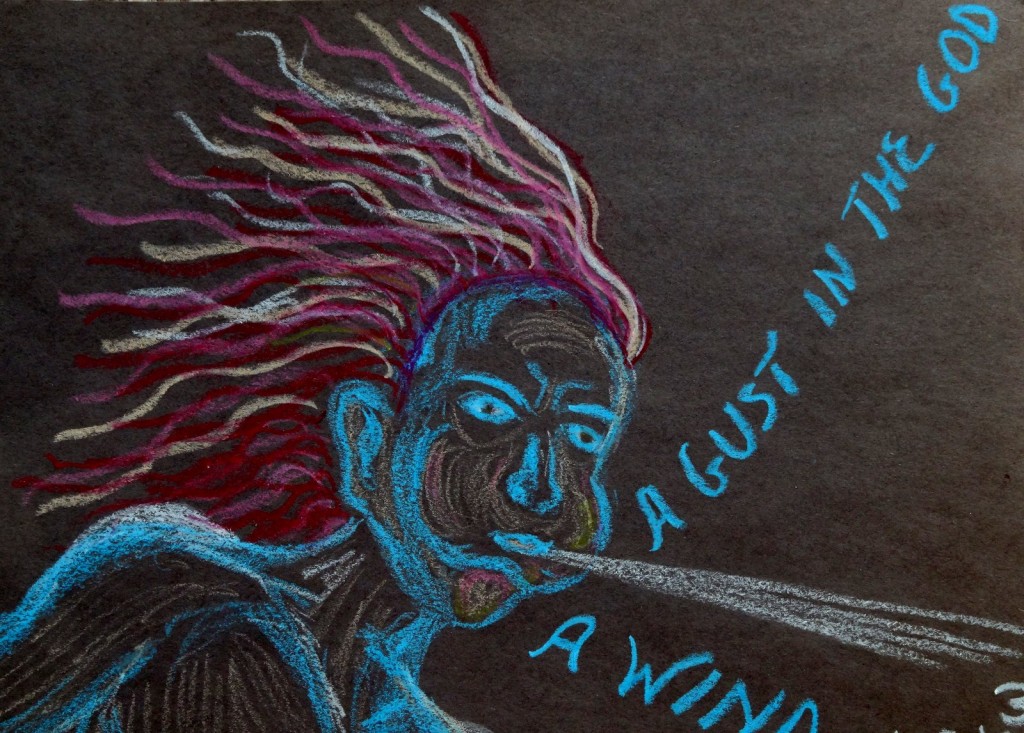
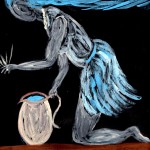 I read Rilke, made soup, accompanied Vic to every appointment, and paid attention. In the chemotherapy infusion room, I noticed bald women, stooped men, and defiant teenagers trying to balance their harsh experience with a call from a friend, the smile of a nurse or companion, or music on their iPod. All of us had landed in a strange world of toxic treatment and unexpected complications. Loss couldn’t be ignored, so we reached out for an antidote.
I read Rilke, made soup, accompanied Vic to every appointment, and paid attention. In the chemotherapy infusion room, I noticed bald women, stooped men, and defiant teenagers trying to balance their harsh experience with a call from a friend, the smile of a nurse or companion, or music on their iPod. All of us had landed in a strange world of toxic treatment and unexpected complications. Loss couldn’t be ignored, so we reached out for an antidote.
Rilke’s words helped me see that I could do more than be battered by this threat. This shattered life was our particular slice of experience and we had no choice. It could break us, or it could teach and strengthen us. Maybe both.
Let this darkness be a bell tower
and you the bell. As you ring,
what batters you becomes your strength.[ii]
Searching for life and light within the darkness became my practice. Whenever there was a lull in my day, whenever the anxiety and fear overflowed, before I fell asleep at night, I remembered. Death is part of every experience, including pleasure. As I devour an apple, I’m enjoying the death of the apple. As I swoon over a sunset, the day is dying. I am warmed in winter by the wood of a dead tree.
Within the container of this ancient myth, I knew our world was as much about living as dying. If I remembered and consciously noticed, I sometimes found splendor and mystery in the darkness.
But life holds mystery for us yet. In a hundred places
we can still sense the source: a play of pure powers
that—when you feel it—brings you to your knees.[iii]
***
What helps you gain a strong footing in uncertain times? My paintings and drawings came from mythology classes. We first worked on understanding a sonnet and then drew an image from that sonnet. I write more about mythology in Leaning into Love: A Spiritual Journey through Grief. Some of the ideas in this post were shared in a guest blog at Matrignosis called Mythological Healing in Times of Crisis. For another blog about finding support from poetry, please enjoy Poems to Grieve By.
[i] Rainer Maria Rilke, “Sonnets to Orpheus: Part Two, XXVII,” in In Praise of Mortality: Selections from Rainer Maria Rilke’s Duino Elegies and Sonnets to Orpheus, trans. and ed. Anita Barrows and Joanna Macy (New York: Riverhead Books, 2005) 133.
[ii] Rainer Maria Rilke, “Sonnets: Part Two, XXIX,” 135.
[iii] Rainer Maria Rilke, “Sonnets: Part Two, X,” 115.

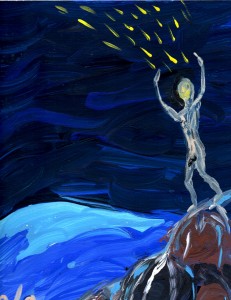
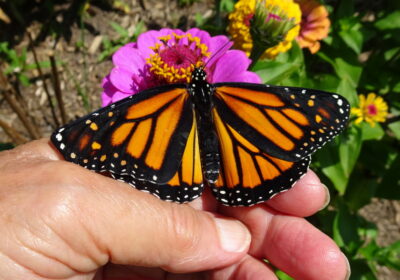
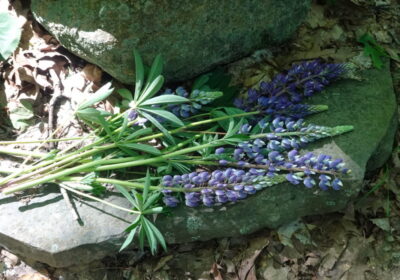
November 30, 2019 at 1:29 pm
Lauren Banner
Such a beautiful piece of writing. Thank you so much. Your reflections are deep pools of good medicine. “Searching for life and light within the darkness”, what a profound practice.
The word for “world” in Tibetan is jik-den, it means disintegrating basis, or momentary existence. Impermanence is part of the meaning of the word. The worldview is included in the language. Brilliant.
What else do I appreciate about your piece? You offer suggestions for ways of applying your study. This is wonderful example elder wisdom. “As I devour the apple I enjoy the death of the apple…”.
November 30, 2019 at 8:31 pm
Elaine Mansfield
Lauren, I stood on the threshold with you and I’m forever grateful you were there. Thanks for explaining “jik-den” and the deep implications of the term.
I feel nothing but gratitude for Rilke whose images guided me through the hardest times.
February 9, 2015 at 8:01 am
Susan Scott
I came by you via Jean Raffa Elaine and I’m so glad I did. Thank you for sharing your lovely post.
Life, Death – apparently complete opposites but they’re not really are they .. there’s something eerily synchronistic in my coming by this today. Thank you again.
February 9, 2015 at 2:41 pm
Elaine Mansfield
Thank you, Susan. I’m so glad Jeanie connected us and I’m so glad to be reconnected in person with Jean. Rilke helped me deeply understand how the opposites were always there in every experience. Once I began watching the small events in life from that perspective, I saw it in the larger events, especially the hard ones.
Best to you,
Elaine
January 30, 2015 at 1:36 pm
Shirley Hershey Showalter
What a resource poetry and ancient myths can be as we face our darkest hours. Your depth experiences together with Vic and now apart from him are breathing life into these stories for yourself and others.
Just like “a gust in the God” drawing above.
May the winds of the spirit blow free.
January 31, 2015 at 7:52 am
Elaine Mansfield
I agree, Shirley. I found myself reciting both the Lord’s Prayer and the Heart Sutra and learning from Biblical stories and Mesopotamian myths. I want to write more about myth and I’m about to go to FL to create a workshop on mythology and grief–although it looks as though my departure day on Monday is likely to be a no fly day because of snow. I’ll try to remember how lucky I am to be warm and fed and not complain too much about the inconveniences of travel.
Many wild gusts in the weather this January.
January 30, 2015 at 11:24 am
karal gregory
Through grief I have learned to enjoy life. Thank you for sharing your beautiful words and art.
January 31, 2015 at 7:44 am
Elaine Mansfield
Hi Karal,
That’s a powerful first sentence. We can’t waste this precious life, can we? Grief took me to deeper layers of love and gratitude and made me less afraid of pain. I learned to trust myself more and find more value in solitude.
Thank you for the beautiful review you wrote of ‘Leaning into Love.’
Wishing you joy,
Elaine
January 29, 2015 at 5:42 am
Ann Marie Ackermann
I love the image of the bell. We are most eloquent when something has struck us. That is the message I’ll be carrying away from your blog. Thanks for the uplifting thoughts.
January 29, 2015 at 10:11 am
Elaine Mansfield
I like this, too, Ann Marie, although I’d rather skip the battering. No choice sometimes. I love Rumi’s, “the wound is the place where the light enters you.” Or Leonard Cohen’s, “there is a crack in everything/ that’s how the light gets in.” We are strengthened and also opened and made a little humble–at least temporarily. Thank you for your comment.
January 28, 2015 at 11:33 pm
Carol Rodi
Thank you for your words as they help me find my way as I reach deep for understanding of impermanence…and of myself . Seventeen months today that my husband has died, ” this uncontainable night…” I make a lot of soup these days as I navigate this darkness. Rilke’s words describe it so well. Namaste.
January 29, 2015 at 10:06 am
Elaine Mansfield
Thank you for your comments, Carol. Seventeen months is a short time–or at least it felt like a short time to me along with feeling like forever. Those opposites. I’m sorry we both lost our beloved ones. When I read Rilke and some other poets, I felt that they knew where I was. Making soup always helps. A friend of mine has a very sick husband. I just offered soup.
January 28, 2015 at 11:07 pm
Janet Wylde
This was a beautiful piece, Elaine. I always am so moved by your writing and photographs but the pieces of art are exquisite and had me captivated.Thank you
January 29, 2015 at 10:02 am
Elaine Mansfield
Thank you, Janet. I loved creating those drawings and paintings. Despite my poor skills, the images felt powerful.
January 28, 2015 at 5:48 pm
Lori. Yelensky
Once again your words help me Elaine…..especially now!!!
January 28, 2015 at 6:46 pm
Elaine Mansfield
Thank you, dear Lori. I’m thinking of you and Richie every day–and I had no trouble connecting on Caring Bridge. May all be well. Remember how wonderful it is to walk on the plowed roads of Mt. Hope Cemetery just across the road from Strong Hospital. I walked there every day while Vic napped. Lots of history and a little touch down into the human situation, huge trees, flocks of crows, and open roads for walking.
January 28, 2015 at 9:16 am
Peggy Keating
A beautiful inspiring piece, Elaine. Thank you!!
January 28, 2015 at 11:55 am
Elaine Mansfield
Thanks so much, dear Peggy. And on we go in our world of change.
January 28, 2015 at 12:23 am
D.G. Kaye
‘Death is part of every experience, including pleasure,; so profound. The myth of Orpheus is a prime example of our humanity. Much of Greek mythology is comparable to life lessons of our own times. Fantastic piece here Elaine. 🙂
January 28, 2015 at 11:54 am
Elaine Mansfield
Thank you, Debby. I love mythology and the lessons I’ve learned from it. Every spiritual tradition has its wisdom stories and we get to see history reflected in the imagination of storytellers.
January 27, 2015 at 8:44 pm
Robin Botie
Yes, my fellow searcher of light and life, death is part of it all. I joined Death Cafe Ithaca to try to have a closer relationship with death. At the quarterly meet-ups, we have coffee, tea, and cakes and talk about all aspects of death. Since dying is in all of our futures, I feel it’s a good idea to talk about it. As for impermanence – I’m still trying to understand the concept of “permanent.” Permanent was the stinky stuff that was put in my hair to have curls. Still working on this but is there anything that isn’t impermanent?
January 28, 2015 at 11:51 am
Elaine Mansfield
You have it, Robin. Anything we know, anything that is born, everything we think, anything that is created, anything of the world is impermanent. The trouble is we forget and expect things, including our own bodies to last forever, just as they are. And people we love and count on are definitely permanent. Oh, they’re not? I forgot. Glad you joined Death Cafe. I’ve heard it’s wonderful.
January 27, 2015 at 7:09 pm
Annah Elizabeth
Yes…”Death is part of every experience, including pleasure. As I devour an apple, I’m enjoying the death of the apple. As I swoon over a sunset, the day is dying. I am warmed in winter by the wood of a dead tree.”
Yes, there is correlation, for this is Anticipation, Perfectly Paused…
“But life holds mystery for us yet. In a hundred places we can still sense the source: a play of pure powers that—when you feel it—brings you to your knees.[iii]”
Thank you for sharing your beautiful wisdom…
Yours in hope, healing, and happiness,
~AE
January 28, 2015 at 11:36 am
Elaine Mansfield
Thank you, Annah Elizabeth. I appreciate your kind comments and the resonances in our writing and work.